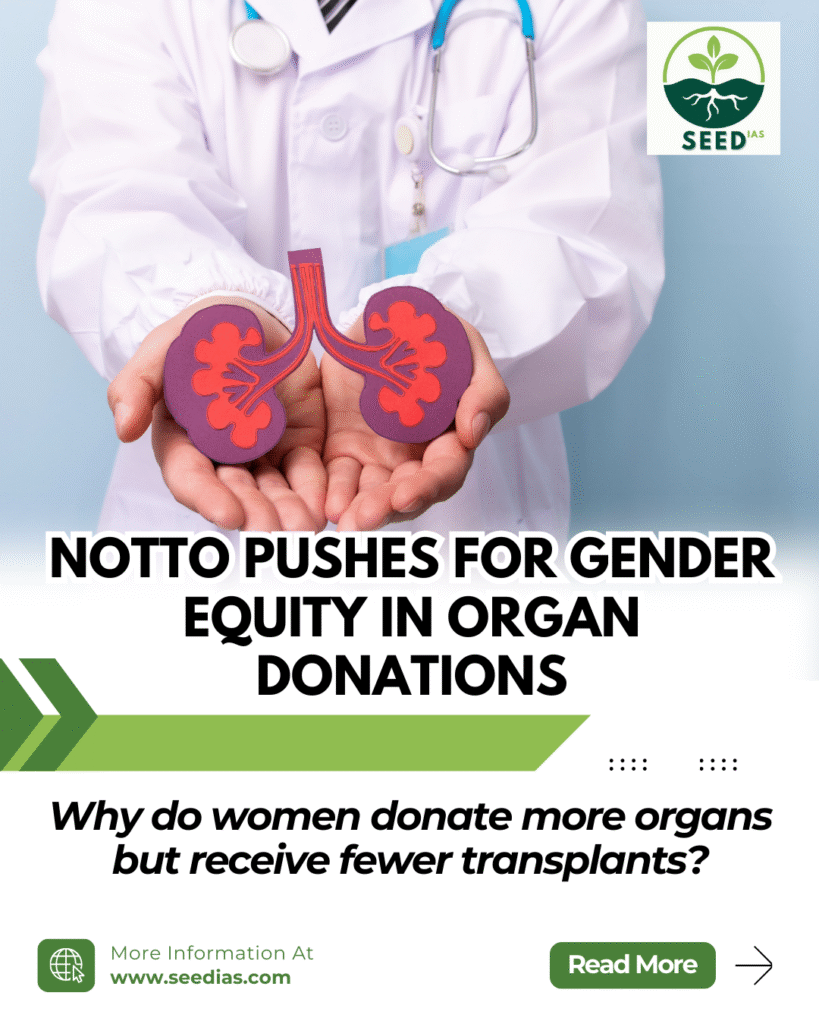Why do women donate more organs but receive fewer transplants?
News Trigger
The National Organ and Tissue Transplant Organisation (NOTTO) has issued a 10-point advisory prioritising women patients and relatives of deceased donors in organ allocation to address gender disparity in transplants.
Concept Corner
| Keyword | Explanation |
| NOTTO | Apex body under the Central Government regulating organ and tissue donation and transplantation in India. |
| Transplantation of Human Organs Act, 1994 | Governs organ donation in India; prohibits buying/selling of organs; allows live and deceased (brain-stem dead) donations. |
| Living Donor | A healthy person (often a relative) who donates an organ such as kidney or part of the liver. |
| Deceased Donor | Person declared brain-dead or after cardiac death whose organs are retrieved for transplantation. |
| Gender Disparity in Donation | Women form the majority of donors but are far fewer among recipients. |
Core Highlights
- Disparity in Donations vs. Recipients
- From 2019–2023, women made 63.8% of all living donations.
- But 69.8% of organ recipients were men.
- Recent NOTTO Advisory
- Women patients and relatives of deceased donors will get priority in organ allocation.
- Calls for permanent transplant coordinator posts in hospitals.
- Advises trauma centres to be registered as retrieval centres.
- Global & Indian Status
- WHO: 1.3 lakh solid organ transplants annually worldwide, meeting just 10% of global need.
- In India: 1.8 lakh develop kidney failure yearly, but only 12,000 kidney transplants occur.
- Barriers to Donation
- Lack of awareness.
- Cultural myths and taboos.
- Family hesitation to consent.
- Life-Saving Potential
- One donor can save up to 8 lives with organs.
- Can also improve quality of life through tissue donations like corneas and skin.
Recent Developments
- BMJ Study (2023): “India’s organ transplant paradox: women donate the most and receive the least.”
- Government push: Training ambulance staff & emergency responders to identify potential deceased donors.
- Appeals: Public/family appeals raise awareness but do not bypass official waiting lists or allocation rules.
Practice Question
With reference to organ donation in India, consider the following statements:
- Under the Transplantation of Human Organs Act, 1994, commercial trade in organs is punishable.
- Women constitute the majority of living organ donors in India.
- Every family appeal for organs ensures immediate priority allocation to the patient.
Which of the statements given above is/are correct?
(a) 1 and 2 only
(b) 2 and 3 only
(c) 1 and 3 only
(d) 1, 2 and 3














